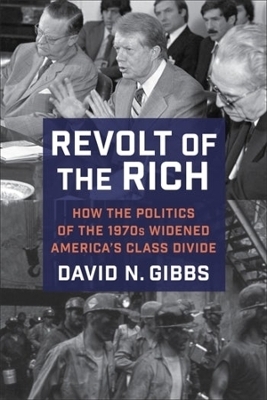
Revolt of the Rich
How the Politics of the 1970s Widened America's Class Divide
Seiten
2024
Columbia University Press (Verlag)
978-0-231-20591-7 (ISBN)
Columbia University Press (Verlag)
978-0-231-20591-7 (ISBN)
Inequality in the United States has reached staggering proportions, with a massive share of wealth held by the very richest. How was such a dramatic shift in favor of a narrow elite possible in a democratic society? David N. Gibbs explores the forces that shaped the turn toward free market economics and wealth concentration and finds their roots in the 1970s. He argues that the political transformations of this period resulted from a “revolt of the rich,” whose defense of their class interests came at the expense of the American public.
Drawing on extensive archival research, Gibbs examines how elites established broad coalitions that brought together business conservatives, social traditionalists, and militarists. At the very top, Richard Nixon’s administration quietly urged corporate executives to fund conservative think tanks and seeded federal agencies with free-market economists. Even Jimmy Carter’s ostensibly liberal administration brought deregulation to the financial sector along with the imposition of severe austerity measures that hurt the living standards of the working class. Through a potent influence campaign, academics and intellectuals sold laissez-faire to policy makers and the public, justifying choices to deregulate industry, cut social spending, curb organized labor, and offshore jobs, alongside expanding military interventions overseas.
Shedding new light on the political alliances and policy decisions that tilted the playing field toward the ultrawealthy, Revolt of the Rich unveils the origins of today’s stark disparities.
Drawing on extensive archival research, Gibbs examines how elites established broad coalitions that brought together business conservatives, social traditionalists, and militarists. At the very top, Richard Nixon’s administration quietly urged corporate executives to fund conservative think tanks and seeded federal agencies with free-market economists. Even Jimmy Carter’s ostensibly liberal administration brought deregulation to the financial sector along with the imposition of severe austerity measures that hurt the living standards of the working class. Through a potent influence campaign, academics and intellectuals sold laissez-faire to policy makers and the public, justifying choices to deregulate industry, cut social spending, curb organized labor, and offshore jobs, alongside expanding military interventions overseas.
Shedding new light on the political alliances and policy decisions that tilted the playing field toward the ultrawealthy, Revolt of the Rich unveils the origins of today’s stark disparities.
David N. Gibbs is professor of history at the University of Arizona, with a courtesy appointment in Africana studies. His books include First Do No Harm: Humanitarian Intervention and the Destruction of Yugoslavia (2009).
Introduction
1. The Rich Accept a Compromise
2. The Rich Revolt
3. Building a Mass Base
4. Selling a New Cold War
5. The Rich Go Global
6. The Triumph of Laissez-Faire
Conclusion
Acknowledgments
Notes
Bibliography
Index
| Erscheinungsdatum | 15.05.2024 |
|---|---|
| Verlagsort | New York |
| Sprache | englisch |
| Maße | 152 x 229 mm |
| Themenwelt | Geisteswissenschaften ► Geschichte ► Regional- / Ländergeschichte |
| Sozialwissenschaften ► Politik / Verwaltung ► Politische Systeme | |
| Sozialwissenschaften ► Politik / Verwaltung ► Politische Theorie | |
| ISBN-10 | 0-231-20591-0 / 0231205910 |
| ISBN-13 | 978-0-231-20591-7 / 9780231205917 |
| Zustand | Neuware |
| Informationen gemäß Produktsicherheitsverordnung (GPSR) | |
| Haben Sie eine Frage zum Produkt? |
Mehr entdecken
aus dem Bereich
aus dem Bereich
Erinnerungen
Buch | Softcover (2024)
Pantheon (Verlag)
16,00 €
Universalgelehrter, Polarreisender, Entdecker
Buch | Hardcover (2024)
mareverlag
28,00 €


